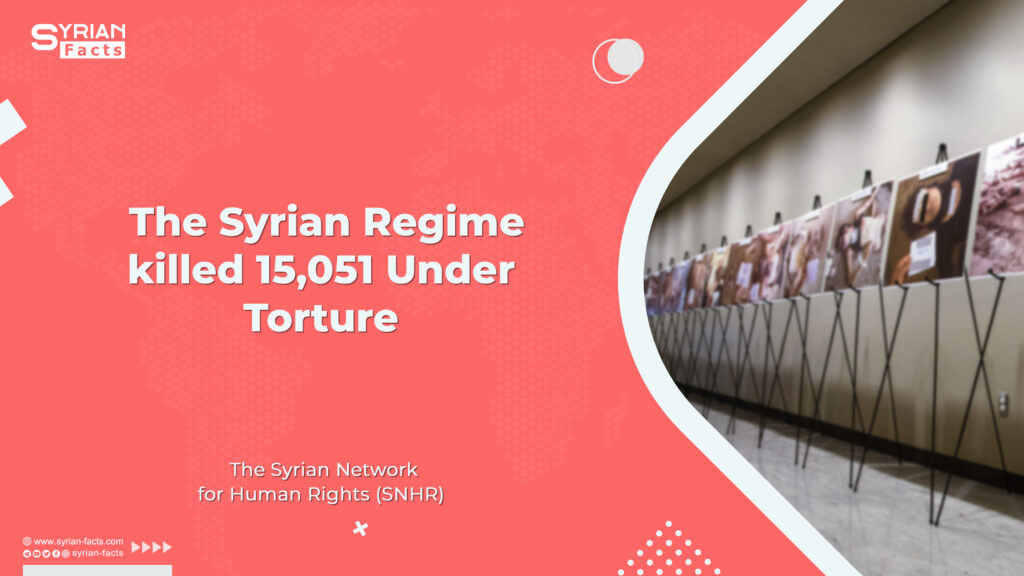The Hague – The Syrian Network for Human Rights (SNHR) today released a report entitled, ‘The Syrian Regime is Accused of Killing 15,051 Individuals, Including 190 Children and 94 Women, Under Torture in Its Detention Centers Since March 2011, While Nearly 136,000 Remain Forcibly Disappeared’, in which the group hailed the case brought by Canada and The Netherlands against the Syrian regime before the International Court of Justice (ICJ) as a serious step on the path of accountability.
The 14-page report stresses that torture is practiced inside Syrian regime detention centers in accordance with a well-planned, centrally organized, comprehensive, and calculated policy in which the overwhelming majority of regime detention centers are implicated, and which involves all the different echelons of power among the regime’s security authorities, from the lowest to the highest-ranking officers. Torture is used for different goals and motives, including to extract confessions which are later used to bring various charges against the detainees, given a lack of any tangible evidence to convict them except for such ‘confessions’ coerced through torture, or to take collective retaliation and revenge against all dissidents who dare to oppose the ruling authority (with detainees automatically classified in this category simply by virtue of being arrested), or because of their dissident activism.
Approximately 1,250 death certificates issued for forcibly disappeared persons who had died due to torture, with the Syrian regime failing to notify their families
The report notes that, in most cases, the Syrian regime does not notify victims’ families of their deaths in regime detention centers on the date of their death. Usually, families find out about their loved ones’ deaths either through former prisoners, following multiple visits to the Military Police’s headquarters in Damascus, or through the records in civil registry offices. Families usually learn of their loved ones’ death years after they happened. SNHR has obtained approximately 1,250 death certificates of forcibly disappeared persons who had died due to torture. The Syrian regime has not yet officially notified their families of their loved ones’ death as of this writing.
The Syrian regime has used no fewer than 83 methods of torture in its detention centers
The report outlines the numerous methods of torture seen in regime detention centers. In that, the report notes that these vary in severity and cruelty. Whichever methods are used, however, torture has been practiced so extensively in regime detention centers that almost every detainee who survived the regime’s detention centers has experienced one or multiple torture methods. The report categorizes those torture methods into eight main types, with every type including several torture methods, reaching a total of 83. As the report further reveals, death sentences have been carried out in a widespread manner in regime detention centers, including against children, where no fewer than 14,843 death sentences have been issued by the Military Field Courts between March 2011 and August 2023. Of those, 7,872 death sentence have been carried out. All of the 7,872 dead bodies of the victims executed have not been returned to their families, and their families have not been officially notified of their execution.
The case brought against The Netherlands and Canada against the Syrian regime before the ICJ is a serious step on the path of accountability
The report further reveals that The Netherlands and Canada, drawing upon the abundance of reports and evidence proving the Syrian regime’s violations of the UN Convention Against Torture and upholding their obligations as members of the Convention, have filed a case with the International Court of Justice (ICJ) against the Syrian regime for failing to uphold its obligations under the Convention. The two governments have also requested temporary measures to be quickly adopted to protect the victims. On September 28, 2023, the ICJ announced that the first public hearing session for the case filed by the Netherlands and Canda against the Syrian regime, based on the Convention Against Torture and Other Cruel, Inhuman or Degrading Treatment or Punishment of 1984, will be held on October 10, 2023.
The report hails this trial as a serious step on the path of long overdue accountability, after the Syrian regime has been given absolute impunity for 13 years. In that regard, the report expresses hope the court will impose the harshest possible provisional measures against the Syrian regime, which is known for destroying evidence and for its refusal to cooperate with UN bodies, or international and local human rights organizations.
The report emphasizes that the Syrian regime practices torture in a systematic and widespread manner, violating the right to life, which constitutes a blatant breach of international human rights law. It has been repeatedly proven that the Syrian regime has full knowledge of these practices, and is fully aware that these inhumane detention conditions lead inevitably to detainees’ deaths. The Syrian regime has deliberately allowed for, and carried out such practices through a decision made by a hierarchy that begins from the President of the Republic; related to him directly are the ministers of defense and interior and the National Security Bureau, and their affiliated security apparatuses.
The report calls on the governments of The Netherlands and Canada to call on the ICJ to adopt the harshest possible provisional measures against the Syrian regime, including calling on the Syrian regime to end torture and killings under torture, to repeal all sentences issued against arbitrarily arrested detainees since they are based on confession extracted under the duress of torture, and to improve imprisonment conditions since most deaths occur due to poor health conditions.
Furthermore, the report calls on the UN Security Council and the United Nations to, under Chapter VII of the Charter of the United Nations, protect tens of thousands of persons forcibly disappeared at the hands of the Syrian regime from lethal torture, and save those who are still alive, and devise a mechanism to oblige all parties to the conflict, especially the Syrian regime, to put an end to torture practices, and to disclose the locations of the victims’ bodies, and return these to their families, in addition to making other recommendations.





Be the first to write a comment.